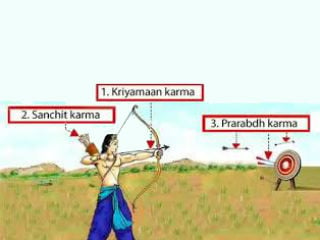
The word ‘Karmayoga’ (Path of Action) conjures images of those giving alms to beggars, setting up educational institutions, and those engaged in social service. However, in most cases, since the activities are at an emotional level or for the sake of publicity, it does not constitute Karmayoga in the real sense of the word. Then, what exactly is Karmayoga? Performing that karma (An act, action which gives rise to Destiny) which will result in spiritual growth and, ultimately, God-realisation, denotes Karmayoga. Even if the karma were to be worldly, performing it in a way such that no new sanskar (Subconscious impression) is created on the chitta (Subconscious mind) and thereby getting freed from the bondage of sanskars forever is the objective of Karmayoga.
1. Definitions of Karmayoga
A. A Path that provides knowledge on why man performs karma, why karmas entrap in bondage, how to perform karmas without getting entrapped in bondage, which are the karmas that liberate a man from worldly bondage (that of Maya), the importance of performing karma even after becoming Jivanmukta (Liberated when still embodied) etc., guides on how to abstain from performing wrong karma and on performing the right karma (so as to eventually attain Moksha) is termed as Karmayoga.
B. ‘When our tendencies gradually change from Tama – predominant to Raja – predominant and then get stabilized in Sattva, and further culminate in bhav (Spiritual emotion), our penance becomes special. This itself is called Karmayoga’. – H.H. Kane Maharaj, Narayangaon, Pune, Maharashtra.
Performing karma as expected by the Hindu Dharma and the scriptures, by sacrificing the attachment and the expectations of the fruit, is a supreme definition of Karmayoga.
2. Karma and Karmayoga
Karma plainly means an action or a deed. It is not limited to just physical actions like eating, drinking, walking, laughing etc., but also includes all karmas performed by the five sense organs, five motor organs, mind and intellect. Karmayoga means to keep performing that karma which will result in our spiritual growth, and thereby we will eternally be associated with Brahman or God. In short, getting liberated from the cycles of birth and death through the medium of action is Karmayoga.
योगयुक्तो विशुद्धात्मा विजितात्मा जितेंद्रिय: ।
सर्वभूतात्मभूतात्मा कुर्वन्नपि न लिप्यते ।।
– Shrimadbhagwadgeeta, 5.7
Meaning: The one who performs karmas with devotion, who has conquered the five senses and the mind, is dear to all and all are dear to him. Even though he performs karmas continuously, yet he does not get entangled in it, that is, he is free from the bondage of karmas.
A. Karmas from Karmayoga are not just
any karma, they are those specified in the Vedas
‘In the present age, the Sanskrut phrase ‘योग: कर्मसु कौशलम् ।‘ is interpreted as ‘Expertise in performing karma is Karmayoga’. The modern people feel that performing any karma expertly is by itself Karmayoga. In reality, karma advised by the Vedas is karma specified by Karmayoga, and that precisely is Karmayoga.
B. Performing karmas expertly that are not
mentioned in the scriptures is not the intent of the Karmayoga
‘That which does not create bondage to karma is Yoga. Karma prescribed by the scriptures should be performed with such expertise that no kriyaman-karma (Wilful actions, that is, according to one’s own free will) is generated. Yoga is not meant for performing karma expertly that finds no mention in the scriptures. (Performing prohibited karmas like drinking, smoking, etc. in a stable state of mind is not Yoga). Yoga is meant for attaining Mukti (Liberation). A pleasant state of the antahkaran (The inner sense organs consisting of the conscious mind, subconscious mind, intellect, and ego) is the visible consequence of Yoga.’ – From ‘Shrimadbhagwadgeeta, Adhyaya 2’ written by Gurudev Dr Kateswamiji

 Using Kriyaman-karma effectively
Using Kriyaman-karma effectively Importance of Kriyaman-karma in overcoming Prarabdha-karma
Importance of Kriyaman-karma in overcoming Prarabdha-karma How to overcome sufferings of Prarabdha
How to overcome sufferings of Prarabdha Facing the consequences of Prarabdha
Facing the consequences of Prarabdha What is Sanchit-karma and Prarabdha?
What is Sanchit-karma and Prarabdha? Kartavya (Duty) karma
Kartavya (Duty) karma